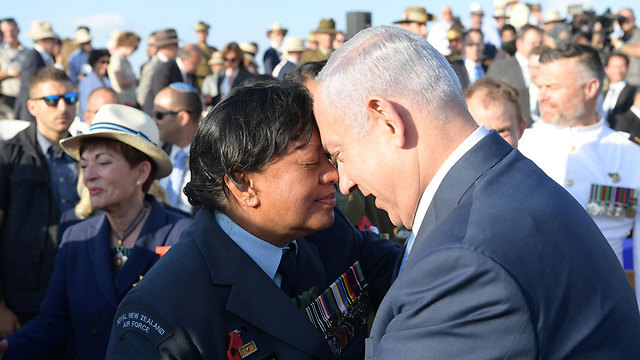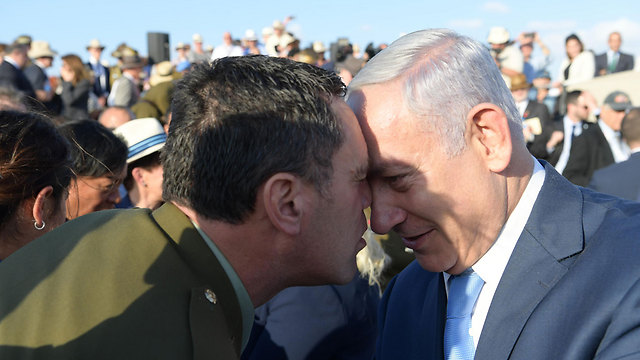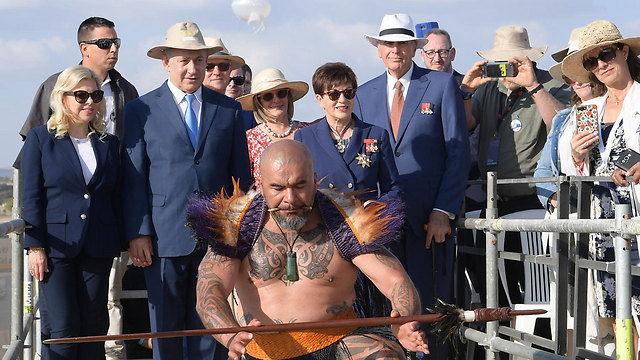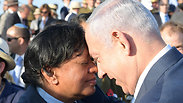

PM attends traditional Māori ceremony in Be'er Sheva
PM Netanyahu and wife Sara attend ceremony memorializing fallen New Zealand soldiers killed in battle of Be'er Sheva against Ottomans during World War I; Netanyahu welcomed with Māori nose-rubbing kisses, war dance; also in attendance are Australian PM Turnbull, New Zealand Governor-General Reddy.
Prime Minister Benjamin Netanyahu participated Tuesday in a Tel Be'er Sheva ceremony for New Zealand soldiers killed in the battle to liberate the city from the hands of the Ottoman Turks. The event took place as part of the centennial for the city's liberation by Australian and New Zealand Army Corps (ANZAC) soldiers.
During the event, a traditional Māori war dance—or haka—was performed by soldiers from the New Zealand army. The prime minister was even treated to a Māori nose-rubbing kiss from soldiers, who dressed up according to Māori tribal traditions.
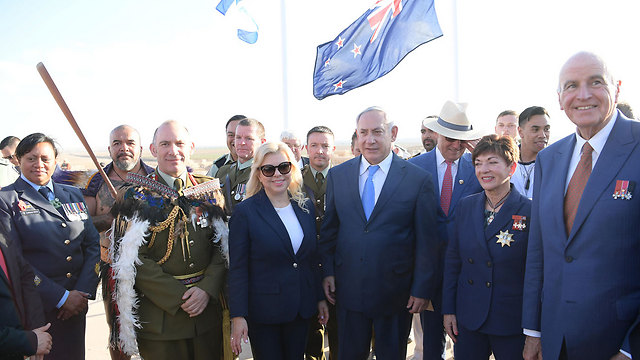
The ceremony was also attended by Australian Prime Minister Malcolm Turnbull and New Zealand Governor-General Patsy Reddy.
Netanyahu extolled the Anzac effort in the battle for Be'er Sheva during World War I. "In my opinion, this is the first time Māori language was officially spoken at Tel Be'er Sheva. It's beautiful, and certainly memorable. We're here to commemorate an act of heroism, which changed history. The indomitable spirit of New Zealand's soldiers here and the Australian light cavalry brigade turned the tide of history. It didn't take long—the entire thing only lasted several hours—but it turned the wheel of fate. It necessitated bravery, determination and doggedness, especially since they were facing fierce, determined and powerful opposition. It makes their accomplishment that much greater.
"We stand here in the city of Abraham, where our ancestors stood 4,000 years ago. Now, thanks to that particular day 100 years ago, you can look at the modern city of Be'er Sheva, with its cyber headquarters and bright prospects. We have peace, prosperity and security, all of which were attained thanks to the heroes of that day," the prime minister added.
After the ceremony, Netanyahu attended a reenactment of the battle of Be'er Sheva near the Turkish train bridge over the Be'er Sheva River.
Earlier Tuesday, Netanyahu attended a memorial ceremony at the British cemetery for Australian troops killed during the city's liberation. "My thanks go out to the Anzac troops and the families of the brave Australians who fought here. 4,000 years ago Abraham arrived to Be'er Sheva, the city of 100 wells. 100 years ago, the brave Anzac soldiers liberated Be'er Sheva for the sons and daughters of Abraham and gave them the opportunity to step through the gates of history. Your sons' heroism will never be forgotten," the prime minister said.
"We have a natural connection with Australians. I don't just mean the way of life, the warmth. That much is obvious. My intention is to point at something much deeper. This partnership began in 1915 with the defeat in Gallipoli. It was (Australians') first meeting with Jewish fighters, which carried on here. It was a partnership that today carries historic meaning," Netanyahu said.
The prime minister then went on to say that when he joined the army, he was given an Australian hat. "We sat by Australian eucalyptus trees and learned of the ethos of heroism of Australian and New Zealand soldiers. We spoke about it. It was a model for us: to defend our people and our values, and the same attitude directs us today," the prime minister added.
Netanyahu also mentioned how 800 cavalrymen fought in Be'er Sheva against 4,000 armed Turks. "The few versus the many: that is the symbol of Israel. We seek peace with all our neighbors, but we will not tolerate any attacks on our sovereignty, on our people, on our land, whether from the air, from the sea, from the ground or below the ground," he cautioned, referencing the denotation of a tunnel used by Palestinian Islamic Jihad terrorists Monday.
"We attack those who seek to attack us. And those who contemplate that, I strongly advise you: Do not test the resolve of the State of Israel or the army of Israel," Netanyahu concluded.














